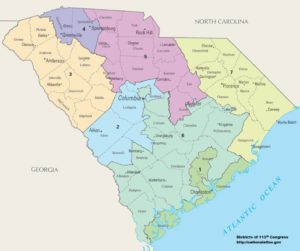By Al Dozier, Statehouse correspondent | South Carolina lawmakers are now working on a statewide redistricting plan to redraw congressional and legislative districts based on new 2020 census data.
But some say the process is seriously flawed.

There’s a strong contention from the South Carolina Progressive Network and the League of Women Voters of South Carolina that redistricting should be overseen by voters, not politicians.
The Progressive Network, a coalition of organizations and individual activists from across the state who have joined forces to promote social and economic justice, recently sent out a press release saying South Carolina is the only state in the nation with no laws or constitutional provisions that set redistricting criteria.
“That’s true, and it’s awful,” said Lynn Teague, vice president for issues and action for the state’s League of Women Voters.
She says the current House, Senate and congressional maps protect incumbents, the majority of whom win their seats in primaries and have no opposition in the general election.
Redistricting is done every 10 years to take into account population changes that could alter the maps for 46 state Senate districts, 124 state House districts and seven U. S. House districts.
According to the Associated Press, the latest census showed South Carolina added nearly 500,000 residents from 2010 to 2020 to become the 23rd largest state in the U.S. with 5.1 million people. Much of that growth was along the coast and the suburbs of Charlotte, N.C. Twenty-four of South Carolina’s 46 counties lost population, mostly in rural areas.
House, Senate committees now at work
A special House committee working on drawing new district maps is now crisscrossing South Carolina.
According to the chairman of the committee, Florence Republican Rep. Jay Jordan, new maps should be completed before the end of the year so they will be in place for the 2022 elections.

Jordan said no one raised issues of partisanship or gerrymandering at hearings this week in Greenville or Rock Hill. He said some citizens have expressed concerns that lawmakers should be aware of the makeup of districts to reflect common bonds, such as farm communities. The committee, comprised of five Republicans and three Democrats, has four more hearings scheduled.
Though he has heard the criticisms about the process, Jordan said he does not believe the system is flawed.
“There’s plenty of case law and precedent,” he told Statehouse Report. “We have a process that we’ve done every 10 years.”
Jordan said the complaint that the committee has no rule book is incorrect. He said the legislature has a set of guidelines that are carefully followed.
“Public input is indispensable to ensuring our districts best represent the people of South Carolina,” Jordan said in public comments at the redistricting meeting in Florence. “We truly are the house of the people. We want your input on specific issues or concerns in your communities, in your neighborhoods.”
A Senate committee has already held 10 hearings across the state.
Jordan said the House and Senate will vote on the final maps, which have to be adopted by the end of the year so they will be in place for the 2020 elections. He said the governor will have to sign the bill.
Pushing for more fairness in the process
There is a current proposal in the House (H. 4202) and Senate (S. 750) for new redistricting guidelines that is strongly supported by the S.C. Progressive Network. Supporters say the measure, known as the FAIR act, promotes fairness and accountability in redistricting and ensures public input in the process

Sponsors are Sen. Mike Fanning. D-Fairfield, and Rep. Gilda Cobb-Hunter, D-Orangeburg.
Fanning and Cobb-Hunter recently held a press conference on their proposal, which can be viewed on the website FairmapsSC.com.
“What we are proposing is that people pick the politician, rather than the politician picking the people,” Cobb-Hunter said during the press conference.
Fanning said the redistricting system that has been in place for decades “is a game with no rules.”
The legislation will not allow for interference by legislators, the executive branch or anyone who is related to a legislator, Cobb-Hunter said.
The state’sLeague of Women Voters has also outlined a proposal for redistricting, which would impose a series of changes league officials say are needed to make the system more reflective for voters.
“Gerrymandering” is the common description of how politicians make districts protective toward incumbents, according to the league’s web site.
Critics of the current system often point howt more than 70 percent of elections in the current districts are decided in primaries, not during general elections.
The league cited two disturbing issues that surface when districts are closely examined: “packing” and “cracking”.
“Packing” is defined as concentrating communities into a few districts where they win overwhelmingly. “Cracking” is indicated when neighboring communities are split into several different districts to ensure they don’t constitute a majority .
The league also has put in place a redistricting advisory committee that consists of eight people from around the state, some Republicans, some Democrats, some from nonprofits.
Teague said the league has prepared but not yet submitted new maps for lawmakers to consider. The maps do not favor incumbents or partisan leaders.

In an interview, Brett Bursey, director of the Progressive Network, said the current redistricting process “is so well-rigged it’s almost impossible to fix it.”
But he said the FAIR Act is a start for a reform process that he admitted could take years. He said he expects the citizens of South Carolina will eventually see the true picture as proponents shine lights on the problem.
It can take a long time, Bursey said. But he added he believes redistricting reform will happen.
- Al Dozier is a veteran Statehouse reporter who lives in Columbia. Have a comment? Send to feedback@statehousereport.com















 We Can Do Better, South Carolina!
We Can Do Better, South Carolina!
Pingback: Charleston Currents – NEW for 9/20: Pride Week, Murdaugh case, pandemic milestones
Pingback: Charleston Currents – NEWS BRIEFS: State sets pandemic milestones on vaccinations, deaths